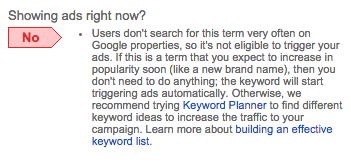As PPC Specialists, we tend to think granularly. We want our campaigns and associated ad groups to be highly segmented and ad copy relevant to our keywords. This thinking makes sense since we want to answer user search queries as specifically as we can. However, can we segment to the point that we’re actually hurting our account?
The answer is yes.
Over Segmentation
Too granular segmentation tends to occur when advertisers over analyze the situation. To showcase this issue, let’s take an example of a merchant who sells K9 Advantix for dogs. The ad groups may be broken out by dog size:
- K9 Advantix for small dogs
- K9 Advantix for medium dogs
- K9 Advantix for large dogs
- K9 Advantix for extra large dogs
They could also be segmented by supply length:
- K9 Advantix 2 months
- K9 Advantix 4 months
- K9 Advantix 6 months
- K9 Advantix 12 months
We would also want to create a general K9 Advantix ad group for broader searches (such as K9 Advantix for dogs). These 9 ad groups are good to begin with as they are highly segmented and will allow for relevant ad copy utilizing the specific keywords and appropriate landing pages.
One could argue that we could segment even further by creating ad groups with both the dog size and supply length. Sample ad groups may include:
- 2 month K9 Advantix for small dogs
- 4 month K9 Advantix for small dogs
- 4 month K9 Advantix for medium dogs
- 6 month K9 Advantix for medium dogs
- 12 month K9 Advantix for extra large dogs
Without looking at keyword tools, I would wager that keywords in these ad groups would receive little traffic, if any at all. From a technical side, they would most likely get slapped with a “low search volume” label, severely limiting impressions.

From a practical standpoint, very few users are searching this granularly. For potential consumers knowing exactly what they want, we may see queries like “K9 Advantix 2 month supply” or “K9 Advantix for smaller dogs,” but utilizing both the dog size and supply length is going to be rare.
The problem will then be compounded if we utilize ad group level negative keywords. Let’s look at these 3 ad groups:
- K9 Advantix for small dogs
- K9 Advantix 2 months
- 2 month K9 Advantix for small dogs
Since we have an ad group that speaks to “2 months” and “small dogs,” we would negative out these terms in the other ad groups. Here’s what that negative keyword structure would look like:

Here’s where our issue lies. Assuming that the keyword “2 month K9 Advantix for small dogs” is labeled “low search volume,” if a user types this query, our ad will not show.
That statement may sound contradictory since I’ve been saying all along that it would be a rare query. However, rare doesn’t mean that it would never trigger an ad. Assuming we didn’t have the “2 month K9 Advantix for small dogs” ad group and ad group level negatives for the other ad groups, a query of “K9 Advantix small dogs 2 month supply” could trigger an ad for a modified broad match keyword of “+K9 +Advantix +small +dogs.” Thus, instead of totally eliminating the possibility of showing an ad for the longer tailed query (since we’re bidding on that keyword and it’s designated low search volume), we give ourselves a chance for that query to trigger an ad from an ad group that is still highly relevant. It sounds complicated, but the solution boils down to understanding search behavior.
Keep It Simple And Then Expand…And Potentially Pull Back Again
When creating your ad groups, determine if you need to segment down to that extra level. Whether it’s plugging keywords into the Keyword Planner or conducting sample searches, determine whether the effort will be worth the reward. If it’s clear that extra segmentation is unnecessary, don’t go more granular. If it’s unclear, I tend to stay where I am and let the data dictate if further segmentation is necessary. Remember, you can always create additional ad groups if the search query report is showing more granular terms.
Conversely, if you do expand and are finding that your keywords are getting tagged with low search volume, don’t be afraid to go back. By segmenting further, you are hindering your ads from showing for potential search queries. Again, this statement does sound like a contradiction against typical advice, but it does happen.
Final Thoughts
The common train of thought for PPC Specialists is to further segment instead of rolling back. For the most part, this strategy is correct and should be followed. However, we do run into situations where we can outthink ourselves and actually hinder performance. With any segmentation optimizations, make sure that the end user will see the value in your efforts. More specific ads are great, but not if they come at the expense of missed impressions.



